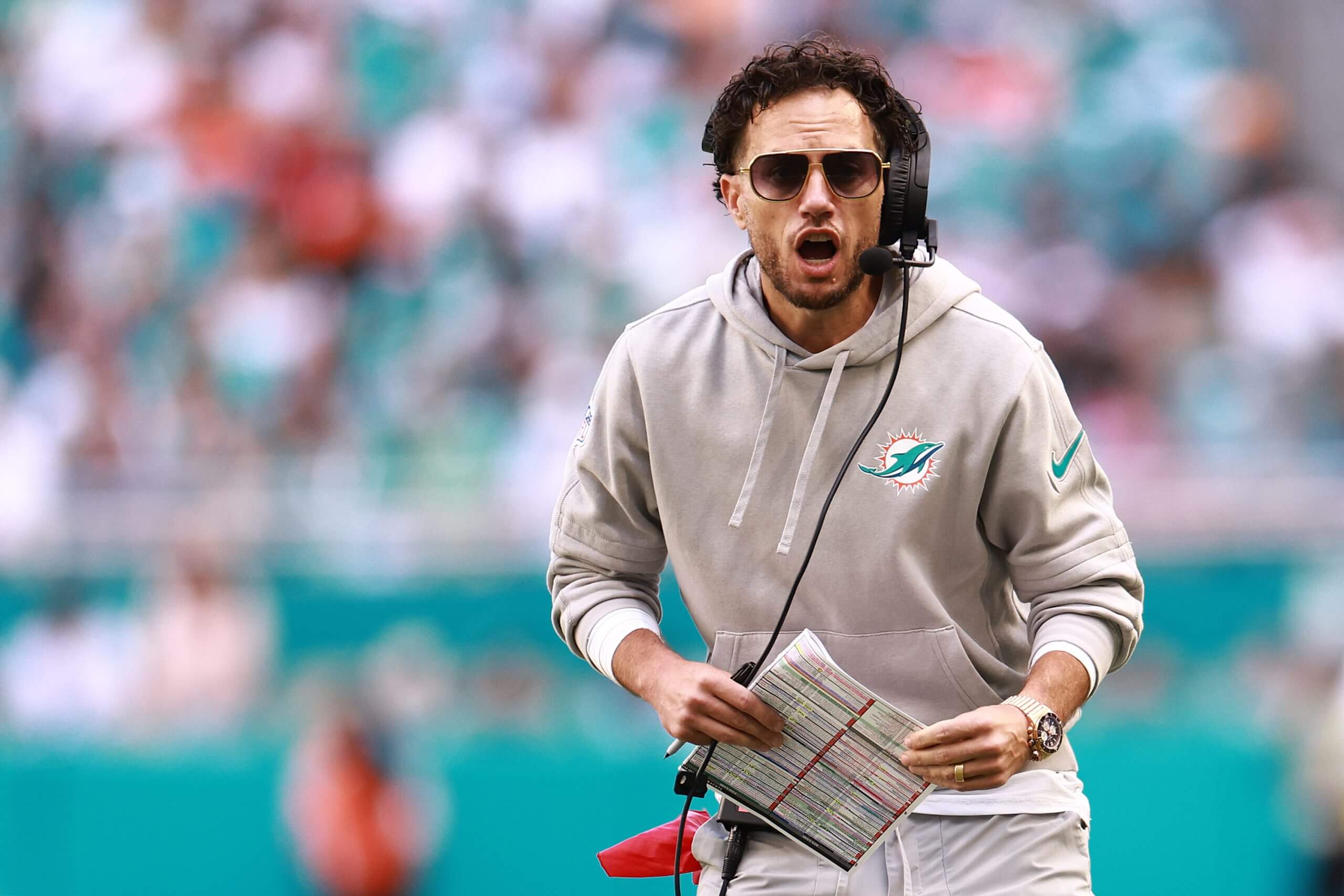Why Mike McDaniel's Dolphins offense could benefit from being a little boring

The Miami Dolphins' performance under coach Mike McDaniel has been lackluster against winning teams, posing challenges for potential bettors. The team's record against winning opponents and struggles in crucial short-yardage situations create uncertainty about their ability to deliver when it matters most. Punters may want to consider these factors when placing bets on their upcoming games.
Miami Dolphins coach Mike McDaniel is one of the most creative play designers in the league. He’s a trendsetter to whom other coaches look to copy plays into their offenses. However, that ingenuity hasn’t translated into real success for the Dolphins. Even at their best, they’ve been a fun, explosive offense that lacks the necessary components to compete with winning teams.
Despite making the playoffs two out of three seasons in McDaniel’s Dolphins’ tenure, he is on the hot seat. There have been questions raised about the team’s culture. Only the team knows how valid those concerns are, but the manifestations of a weak culture have been evident. The biggest one is their inability to beat winning teams. In McDaniel’s tenure, the Dolphins are 6-15 (.286) in the regular season against teams with winning records (0-3 in games when quarterback Tua Tagovailoa didn’t start).
It isn’t just a matter of bad luck. The Dolphins don’t do things that good teams do. They commit penalties at the seventh-highest rate in the league and have the 10th-highest rate of negative plays. They create explosives in the run game, but they don’t run the ball with physicality. Since 2022, they rank 31st in conversion rates on third-and-short and fourth-and-short plays. They’ve gotten progressively worse in the red zone and finished 31st in red zone touchdown percentage last season. They also finished last in success rate on runs against stacked boxes.
Many of their issues stem from physicality, and it begins with their offensive line. Terron Armstead, their best lineman, retired this offseason. The unit has also dealt with several injuries in recent years — including Armstead missing 13 games over the past three seasons — and has lacked the depth to cope with those losses. “To me, I’m excited because I think we have a tangible opportunity to improve that starts in free agency with a couple of guys that we have targeted that you think you can get a deal done with them, and that continues into the draft,” McDaniel said before the draft. “I think it’s a very good time to have some need. We have — it’s time for us to invest in that position, and we are excited to. That can come – I would expect it to surface in both free agency and the draft.”
General manager Chris Grier echoed those sentiments and backed up his words with action. They signed guard James Daniels from the Steelers in free agency. Daniels is a mauler who could give the Dolphins the physical presence they need, but he’s coming back from a torn Achilles, so there is some uncertainty about what version of Daniels we’ll see this season. Grier also traded up in the second round to draft guard Jonah Savaiinaea. They’ll join center Aaron Brewer, who is an effective zone center, and right tackle Austin Jackson, who is a plus starter but also has injury issues.
The biggest question is at left tackle. Grier drafted Patrick Paul in the second round last year to be Armstead’s successor. Paul certainly has the physical profile and movement skills of a prototypical left tackle. Still, it remains to be seen whether he’s ready to fill the considerable void left by Armstead. This line has the potential to be the best one that McDaniel has had, but they need Daniels’ recovery to go smoothly, Jackson to stay healthy, and Paul and Savaiinaea to grow up quickly.
Here’s an example of McDaniel’s creativity. The Dolphins came out in pony personnel (two running backs on the field) with running back Raheem Mostert in the backfield and De’Von Achane in the slot. After shifting tight end Jonnu Smith from the right to the left, Achane went into orbit motionless to the left before reversing field back to the right. Smith’s job was to crack the defensive end from the slot for the right tackle to pull around him and lead for Achane, who was getting the toss while reversing field out of his motion. This is one of many plays the Dolphins have designed to freeze the defense with eye candy and get the ball outside.
Aside from adding to the talent on the line, they need to emphasize the desire to run inside. The offense is built on outside runs and tricking the defense. Those elements will always be part of the offense, but they need to use inside runs more often, not just when they desperately need a yard on third down. Last season, McDaniel did try to call more interior runs, such as “wham.” However, they still ranked 28th in gap scheme usage.
Another issue they have in short yardage is that they are in shotgun or pistol formations far too often. They lined up in shotgun or pistol last season at the fifth-highest rate in the league in third- and fourth-and-short situations. The only teams that should be in those formations in short-yardage situations are option teams with mobile quarterbacks that utilize their designed quarterback runs out of them. Still, Tagovailoa isn’t a running threat due to his concussion issues. Though quarterback sneaks aren’t much of a threat either because they don’t want Tagovailoa slamming his head into the teeth of a defense, getting under center allows the back to get downhill and makes him a threat to get to any gap with speed.
It has become increasingly complex to run outside as Eagles defensive coordinator Vic Fangio’s scheme continues to proliferate in the league. Defenses are playing with light boxes, but when you run outside, you give time for the secondary support players to enter the run fit. Elite offenses are having success punishing light defenses with gap scheme runs. I’m not suggesting that the Dolphins overhaul the scheme, but crank up the dial on gap scheme runs so the line can get reps running them. Allow your line to fire off the ball and express physicality so that when you need that one yard, they have the confidence to get the push they need. This is the type of play that the Dolphins need to put more emphasis on. They are running “Duo,” a play described as power without the puller, but they are running it with a tight end quick motion. Sean McVay started doing this with the Rams.
The motion doesn’t give the defense a chance to adjust to the changing formation strength and gives the tight end a running start to block the play-side end. Paul got driven into the backfield, which forced Achane to change directions too quickly and didn’t allow him to create momentum into the line of scrimmage. Receiver Jaylen Waddle couldn’t get to his blocking assignment from the perimeter, the tight end couldn’t block the strong safety, and Paul got beaten. This is an example of how the team needs to improve at executing interior runs.
Teams like the Detroit Lions, San Francisco 49ers, and Los Angeles Rams don’t get just their physicality from their line. They also have hard-nosed skill players. The 49ers had Deebo Samuel impose his will on secondaries for years. The Lions have David Montgomery as part of their thunder-and-lightning running back duo. The Rams have always had receivers who run block like tight ends. The Dolphins emphasize speed over everything. Tyreek Hill and Waddle give them a unique one-two punch outside. Achane is as explosive as any running back in the league, and he has legitimate slot receiver skills. McDaniel wants backs who can outrun defenders to the edge, but they need a back who can add a punishing element to their offense.
Maybe sixth-round draft pick Ollie Gordon (6 foot 1, 225 pounds) could be a nice complement to Achane and allow him to play on the perimeter more. Gordon was regarded as one of the top backs in college football, but he fell in the draft after a down year. Signing receiver Nick Westbrook-Ikhine gives them a solid blocker on the outside, but the question for them is who will be their blocking tight end. Jonnu Smith, who was traded to the Steelers in June, wasn’t an overwhelming blocker, but he was effective at what the Dolphins asked him to do (crack and seal defenders from the slot). Darren Waller, whom the team just traded for, came out of retirement after admitting that he decided to retire after being asked by the Giants to lead block on a counter run three times in a row. Blocking was never Waller’s strength, and at his age, the Dolphins shouldn’t expect much effort from Waller as a blocker. Having a strong blocker to seal edge defenders is essential for most outside-zone offenses. The 49ers have George Kittle, who is one of the league’s best blocking tight ends. Tight end Durham Smythe did a decent job in that role but was released in February.
McDaniel uses fullback Alec Ingold, one of the best in the league, to help block edge defenders. The Dolphins signed Pharaoh Brown to be their blocking tight end, but the offense will be siloed with Brown as the blocking tight end and Waller as the receiving tight end. The team will depend on Westbrook-Ikhine, Brown, and Gordon to add physicality. Ideally, you want it from your best players, but understandably, this offense is built on speed. The Dolphins ranked 32nd in rate of plays run against single-high defenses, meaning defenses did not respect their run game and played two safeties deep to neutralize Hill and Waddle.
It’s not as if the Dolphins were unwilling to run, but they have to change how they run the ball. They must put a bigger emphasis on gap schemes and running inside. Much of their offense revolves around getting outside and creating displacement with motions and fakes. However, the constant movement makes it difficult for offensive linemen to block moving targets as defenses constantly adjust. Please don’t lose that creativity, but sometimes, it can help to simplify. Get under center more in short-yardage situations.
For McDaniel to keep his job, the offense must be one of the best in the league again and perform when it matters most. For that to happen, the offense has to mature and become a little more disciplined. Miami has some of the necessary tools, but it’ll also require a philosophical commitment.
The head coach could be on the hot seat if his high-octane scheme isn't balanced with some smash mouth football to keep defenses honest.
The Athletic Football Dolphinshttps://betarena.featureos.app/
https://www.betarena.com
https://betarena.com/category/betting-tips/
https://github.com/Betarena/official-documents/blob/main/privacy-policy.md
[object Object]
https://github.com/Betarena/official-documents/blob/main/terms-of-service.md
https://stats.uptimerobot.com/PpY1Wu07pJ
https://betarena.featureos.app/changelog
https://twitter.com/betarenasocial
https://github.com/Betarena
https://medium.com/@betarena-project
https://discord.gg/aTwgFXkxN3
https://www.linkedin.com/company/betarena
https://t.me/betarenaen
 Theathleticuk
Theathleticuk